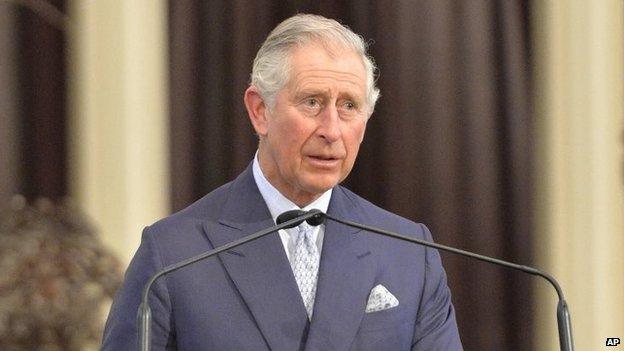Charles letters: What ruling means for freedom of information
- Published

The Supreme Court ruling about Prince Charles's letters to ministers takes freedom of information to the heart of the British state, the most sensitive area of the relationship between the Royal Family and the government.
Or alternatively it's all about a peripheral matter which has little to do with how contemporary political decision-making happens.
That depends partly on your view of the role of the monarchy in the UK today.
But the Supreme Court's judgment, which implies that "advocacy correspondence" from Prince Charles to ministers should be made public, will allow us all greater insight to make up our own minds on this question.
The complexities of the dispute are illustrated by the fact that it has taken 10 years for the case to work its way from the initial FOI request in 2005 to final decision, with the legal decisions along the way operating like a pendulum going back and forth between secrecy and disclosure.
But now the Supreme Court has settled the matter.
However, publication of the actual letters may take some weeks as the government prepares the documents involved for disclosure. The 27 letters have to be redacted to exclude private material which does not constitute the Prince's advocacy.
Since the Guardian's FOI request was made, the Freedom of Information Act has been changed to make material relating to Prince Charles absolutely exempt. So there will be no flood of further disclosures on all the issues he pursues with politicians.
But that absolute block does not apply to environmental information, which is governed by a different law. This is the Environmental Information Regulations, which stem from a European Union directive.
Many of the prince's concerns are known to be environmental, from organic farming to genetically modified technology.
So further revelations in these fields could follow, although every individual request would have to be assessed on its own merits in terms of the overall balance of the public interest.
In the past many of the prince's views have come to public notice, but the constitutional issues involved have become more sensitive as he gets closer to becoming king. Briefing from palace insiders suggests that he would like to be a more activist monarch than his mother, who has been noted for her strict avoidance of public remarks on controversial issues.
But the case also has wider implications for freedom of information.
The outcome represents a fundamental challenge to the use of the ministerial veto to block release of material which the government particularly feels the need to keep secret, after either the information commissioner or the Tribunal has ruled it should be published.
Ministers have also used this veto, which government regards as a vital backstop, in several other cases, including requests for legal advice on the Iraq war, cabinet minutes on devolution policy, an NHS risk register and a review of the proposed HS2 railway by the government's Major Projects Authority.
The implication of the judgment is to curb dramatically the way in which the ministerial veto can be exercised, compared to how it has functioned so far in practice.
The Court's majority judgment states it is a fundamental principle that "a decision of a judicial body should be final and binding and should not be capable of being overturned by a member of the executive".
The ruling implies that ministers cannot overrule a Tribunal decision that information should be released under FOI just because they disagree with it. Other factors need to be in play, such as the emergence of new considerations.
In the case of environmental information, the ruling suggests that, owing to the EU directive, there is no legally valid possibility at all for a ministerial veto after a Tribunal has decided in favour of disclosure.
The government will be annoyed by the fact that Prince Charles's letters from 10 years ago, in which he advocated certain causes, now have to be published.
But ministers and officials will also be deeply concerned by the new restrictions on how the backstop right of veto on FOI disclosure can be used in the cases they most care about.
This issue is likely to be raised by those uneasy about FOI - but it will be a matter for a new government and a new parliament after the general election.
The Supreme Court decision is a huge boost for The Guardian newspaper, which has persistently pursued the material over a decade, and also for FOI activists such as the Campaign for Freedom of Information, who regard it as positive news for citizens wanting to know more about the functioning of government.